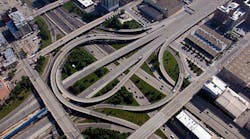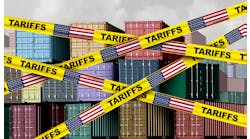President Again Calls for Roads Plan But Isn't Helping Deliver It
President Donald Trump used his State of the Union address to once again call for public works projects to restore the country’s infrastructure. And once again, his plea for bipartisan action may well go unanswered, owing to the deep divisions in Washington he helped sow.
In his prime-time address to Congress on Feb. 5 night, Trump said he’s eager to work with lawmakers on a public works plan and that Republicans and Democrats should cooperate, echoing what he said a year ago. But he didn’t identify how to pay for the program or pledge to campaign to get it passed.
“Both parties should be able to unite for a great rebuilding of America’s crumbling infrastructure,” Trump said in the speech. But then he moved quickly on to other topics.
Repairing infrastructure is an issue that both parties say they can work together to accomplish. But a major initiative hasn’t advanced under Trump because it requires reaching agreement on raising taxes or other politically unpopular ways to generate revenue and to compromise at a time the two parties are polarized.
The president didn’t push for an infrastructure bill while Republicans controlled both houses of Congress. Now Democrats are in charge of the House and are locked in a bitter partisan battle over the president’s demand for funding a wall on the southern U.S. border. That dispute led to a record 35-day partial government shutdown.
Trump campaigned on a promise to invest $1 trillion to upgrade and fix U.S. roads, bridges, airports and other public works, but he opted after taking office to focus on repealing President Barack Obama’s health-care law and passing a tax overhaul without any Democratic votes. In last year’s State of the Union address, he called on Congress to produce a bill that would generate at least $1.5 trillion for new investment.
Democrats rejected the legislative outline Trump released last February after it called for allocating only $200 billion in federal funds over a decade -- mostly to spur states, local entities and the private sector to spend the balance of the proposed $1.5 trillion -– without a defined funding source.
The president has contributed to the partisan rancor by belittling and criticizing the Democratic leaders he needs to enact an infrastructure measure. The tax cuts he backed in 2017 have ballooned the federal debt to $21 trillion despite a booming economy -- making spending for public works more difficult.
Infrastructure advocates say Trump hasn’t exerted the presidential leadership needed to pass an increase in federal fuel taxes or other mechanisms to generate what the American Society of Civil Engineers has estimated to be a $2 trillion shortfall in funding to upgrade critical public works.
“We need a big voice, a big voice from the president that basically says, ‘The nation needs it for our safety, for our well-being, for our national security, and we’re going to work together with everybody to make this deal happen,’” Thomas Donohue, president and chief executive officer of the U.S. Chamber of Commerce, said earlier Tuesday at an infrastructure summit sponsored by the organization.
The chamber, the largest U.S. business lobby, has proposed increasing federal fuel taxes by 25 cents a gallon over five years, and lawmakers who attended a closed-door meeting with Trump last February said he was willing to support such an idea. But Trump never advocated it publicly, and Republican leaders flatly rejected it.
There’s still no consensus on how to pay for a major public works initiative. Democratic Representative Peter DeFazio of Oregon, the new chairman of the House Transportation and Infrastructure Committee, also spoke at the chamber’s event and said he hopes to pass a package in the coming months that would generate hundreds of billions of dollars in investment.
Even so, DeFazio said, he will need Trump’s help to deliver Republican votes for sustainable, long-term federal funding.
“I will work to build bipartisan agreement around legislation, but I can’t do it alone,” DeFazio said a statement after Trump’s speech.
By Mark Niquette



